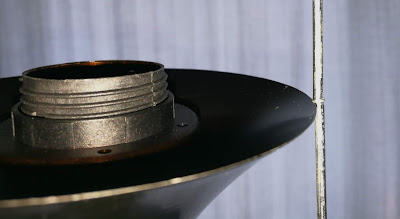The basic idea is to use materials as inexpensive and in-obstructive as possible. While hanging China Balls might be the obvious choice, however, this means that the lighting setup is not really portable.
We came to the conclusion that a suitable floor lamp would be able to hold a China Ball in a decent height, enough for a desk to be illuminated with a soft key light.
A first choice fell on an IKEA product called NOT.
The next problem to be solved was to mount a China ball to the lamp, such that the light source is essentially in the center of the ball, while the ball remains easily removable.
Household grade China balls are usually hung with little eyes on hooks.
 |
| Collapsed China Ball as seen from top, note the eyes to the right and the left |
Your regular household China ball comes with a steel wire frame to suspend the ball from the electrical wire. This employs some sort of clamping mechanism. With a little bit of pliers work, this clamp can be re-purposed as a lower stabilizer. Have a look:
 |
| Only one of the two arms is used, the other is bent out of the way |
 |
| This is how the frame engages with the post of the floor lamp |
The frame of a China ball is created by welding two rods together. This creates a very small lip in the middle of the frame. Here this lip is arranged to abut with the metal cone of the lamp housing.
 |
| Weld of the frame rests on housing cone |
Needless to say that in this setup, the China Ball is mounted from the top
 |
| Top of the China Ball |
Gravity holds the lower end down.
 |
| Bottom of the China Ball |
In this example, a 90cm China Ball was used. Seen the flimsy wire holding it all up, a somewhat lighter, i.e. smaller, ball should be used. Inside the ball, there is a TRADFRI bulb installed. For the following photo, the color temperature of the bulb was set to warm in order to form a contrast to the bright blue sky shining through the curtains.
 |
| NOT and TRADFRI standing China Ball |
(*) Clipping the hooks into the eyes creates tension in the frame and slightly deforms the frame. By doing so, the stability of the frame is compromised. During the first attempt, the ball was clipped to the frame. It turned out to not only be unnecessary, but also detrimental to the setup.
Just as a final remark, NOT, as it comes, provides a maximum height. Using less segments will provide a lower light height. Using more segments, e.g. from a second NOT, could increase the height. The latter option should be taken with great care to stability of the stand. Maybe adding some weight on the food for added stability.



